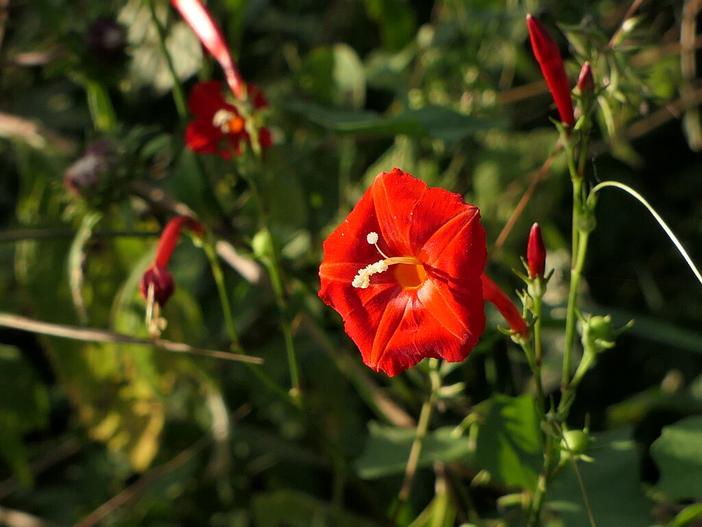Scarlet Creeper
(Ipomoea hederifolia)
Scarlet Creeper (Ipomoea hederifolia)
/
/

Dinesh Valke
CC BY-SA 2.0
Image By:
Dinesh Valke
Recorded By:
Copyright:
CC BY-SA 2.0
Copyright Notice:
Photo by: Dinesh Valke | License Type: CC BY-SA 2.0 | License URL: https://creativecommons.org/licenses/by-sa/2.0/ | Uploader: Dinesh Valke | Publisher: Flickr




































































Estimated Native Range
Summary
Ipomoea hederifolia, commonly known as Scarlet Creeper, is an annual vine or herb. It is native to tropical and subtropical regions of the Americas, including the Caribbean. This vigorous climber can reach heights of 8-10 feet (2.4-3 meters) and spread 2-3 feet (0.6-0.9 meters) wide. It has heart-shaped leaves and produces showy, trumpet-shaped flowers that are typically scarlet to orange-red, blooming profusely in the summer and fall, attracting hummingbirds and butterflies.
Scarlet Creeper is valued for its rapid growth and vibrant flowers, which make it an excellent choice for covering trellises, fences, and arbors in a short period. It is often used in tropical and subtropical gardens for its ornamental appeal and ability to provide quick shade. While it thrives in full sun or part shade, it is adaptable to a range of soil types, provided they have good drainage. It requires medium to low water once established, making it relatively drought-tolerant. However, gardeners should be cautious as Ipomoea hederifolia can self-seed and become invasive outside its native range, so it’s important to manage its spread and remove seedlings as necessary.CC BY-SA 4.0
Scarlet Creeper is valued for its rapid growth and vibrant flowers, which make it an excellent choice for covering trellises, fences, and arbors in a short period. It is often used in tropical and subtropical gardens for its ornamental appeal and ability to provide quick shade. While it thrives in full sun or part shade, it is adaptable to a range of soil types, provided they have good drainage. It requires medium to low water once established, making it relatively drought-tolerant. However, gardeners should be cautious as Ipomoea hederifolia can self-seed and become invasive outside its native range, so it’s important to manage its spread and remove seedlings as necessary.CC BY-SA 4.0
Plant Description
- Plant Type: Vine
- Height: 8-10 feet
- Width: 1.5-3 feet
- Growth Rate: Rapid
- Flower Color: Orange, Red
- Flowering Season: Summer, Fall
- Leaf Retention:
Growth Requirements
- Sun: Full Sun, Part Shade
- Water: Medium
- Drainage: Medium, Fast
Common Uses
Bee Garden, Bird Garden, Butterfly Garden, Hummingbird Garden, Low Maintenance, Showy Flowers
Natural Habitat
Native to tropical and subtropical regions of the Americas, including the Caribbean
Other Names
Common Names: Scarletcreeper, Scarlet Morning Glory, Star Ipomoea, Ivy-Leaf Morning-Glory, Scarlet-Creeper, Star Ipomoea, Trompillo, Liseron Hallier, Liseron Rouge, Amarra-Amarra
Scientific Names: , Ipomoea hederifolia, Ipomoea luteola, Quamoclit hederifolia, Ipomoea angulata, Convolvulus luteolus, Ipomoea praematura, Quamoclit coccinea var. hederifolia, Quamoclit acutangula, Ipomoea coccinea var. hederifolia
GBIF Accepted Name: Ipomoea hederifolia L.